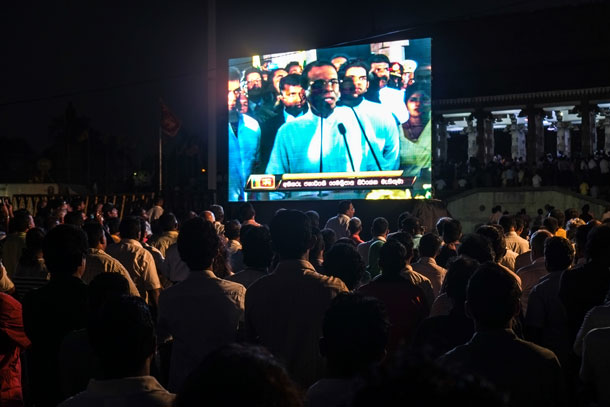
All kinds of newspaper columnists’ tropes slide easily into a review of Sri Lankan opposition coalition candidate Maithripala Sirisena’s unexpected and virtually peaceful election win over incumbent President Mahinda Rajapaksa last week.
"Strong tests have been set" for the new president, "the first 100 days" have been found to be key, his coalition "will be fragile" and "time will tell", but "let us hope wise counsel will prevail". Here, for once, they appear to be appropriate. On these hackneyed lines rest the future of freedom of expression in Sri Lanka.
Sirisina and his new prime minister Ranil Wickremesinghe began their list of 100 tasks in 100 days by ordering the country’s Telecommunications Regulatory Commission to stop blocking independent news websites banned by the old regime.
Sirisena also pledged an end to the lethal "disappearances" that have made the country an Asian byword for media repression. He promises to use his new authority to investigate the 2009 murder of combative political journalist Lasantha Wickrematunge, whose killers are still free. Sri Lankan journalists should feel, “Free to report whatever you want without the fear of being abducted,” he says.
In an open letter to Rajapaksa on the eve of elections, Wickrematunge’s widow Sonali Samarasinghe wrote: "At no time in the history of our country has the freedom of expression so brutally been repressed as it is now. Such media as do operate in the country have been transformed either into propaganda mouthpieces for you and your brothers, or bullied into submission."
Yet while pledging to restore media freedoms in general, there’s a sense of tokenism in Sirisena’s vows. There was no matching commitment to identify the killers of cartoonist Prageeth Eknelygoda, who went missing five years ago, or the forces behind the notorious ‘white van’ abductions during the Rajapaksa era.
“There are many incidents of killings of journalists, attacks, harassment, intimidation, burning of presses, cancelling of radio licences,” says Uvindu Kurukulasuriya, editor of the formerly banned online Colombo Telegraph. “It is not only Lasantha’s murder,” he recently told the International Press Institute.
Much depends on the willingness of the next Chief Justice to challenge impunity and restore the independence of Sri Lankan courts, undermined, say Sirisena’s supporters, by current Chief Justice Mohan Peiris. The new leadership has already vowed to remove Peiris, but changing the judiciary’s culture will take time.
Committee to Protect Journalists(CPJ) says Sri Lanka has the fourth worst record on its 2014 Impunity Index, which spotlights countries where journalists are murdered and the killers remain free. Many of those killed in Sri Lanka were political reporters critical of the government.
A fair investigation into the old regime’s repression and the deaths of at least nine journalists would have to rely on a full truth and reconciliation process. But this is not on Sirisena’s agenda. The new president had a key leadership role in Rajapakse’s cabinet, especially in the closing days of the war against the Tamil Tigers (LTTE), which finished with a bloody series of air and artillery attacks that killed thousands of civilians.
Sirisena’s 100 day action plan and accompanying National Policy Framework list of 100 targets include several vague but ambitious concessions to calls for greater freedom of expression rights, including a Right to Information Bill to be introduced to parliament on Friday, 20 February and passed within three weeks.